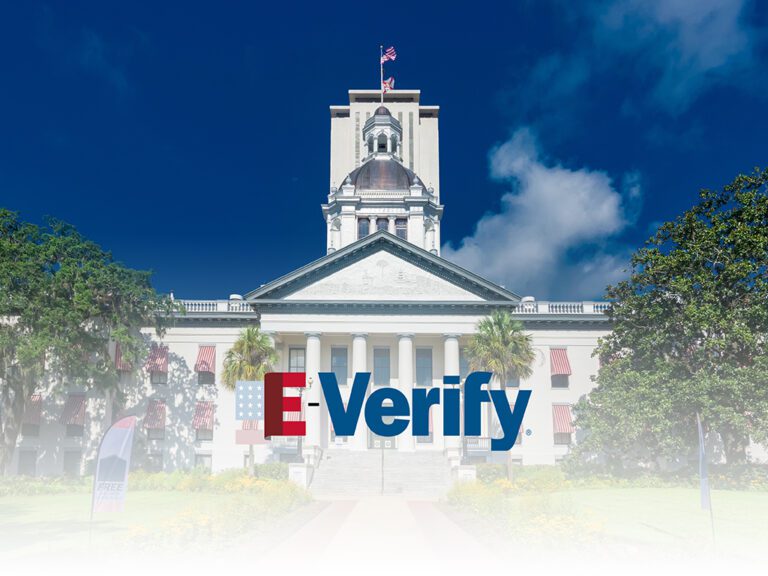Florida Employers Need to Use E-Verify Under New Immigration Law
By Hector A. Chichoni and Kevin E. Vance
October 3, 2023

Hector A. Chichoni practices U.S. and global immigration law and is the chair of the firm’s Immigration Practice in Florida. He represents corporate and individual clients, handles international matters and business transactions, and has represented clients in a wide variety of cases before the U.S. Immigration Court. hachichoni@duanemorris.com
Kevin E. Vance is managing partner of the Duane Morris’ Boca Raton office. He represents businesses in litigation matters, including those involving employees. kevance@duanemorris.com
Originally published in Today’s General Counsel, October 2023
On May 10, 2023, Gov. Ron DeSantis signed SB 1718 into law, dubbing it the “Strongest Anti-Illegal Immigration Legislation in the Country to Combat Biden’s Border Crisis.” The centerpiece of the law, however, is a provision requiring private-sector employers with at least 25 employees to use the E-Verify system to verify the employment eligibility of new employees. This requirement went into effect on July 1, 2023.
E-Verify is an internet-based system that compares information found on the employer’s Form I-9 Employment Eligibility Verification to records available to the U.S. Department of Homeland Security, Social Security Administration and recently, the U.S. Department of State, to confirm that the individuals hired are authorized to work in the United States.
Significantly, the mandatory E-Verify provision will apply only to new hires made on or after July 1, 2023. Employers are not required to use E-Verify with respect to employees hired before that date. Also, the law does not cover independent contractors.
If an employer is unable to verify a newly hired employee because the E-Verify system is unavailable for more than three business days after the new hire begins work, the employer will be required to (i) use Employment Eligibility Verification Form I-9 to verify employment eligibility, and (ii) retain a screenshot or other proof of the system’s unavailability for each day the employer was unable to access the system.
Under the new law, employers must retain a copy of the documentation provided and any official verification generated for at least three years. It appears for now that the new law, based on present federal regulations, intends the document retention requirement to be triggered by the date of employment.
Federal I-9 rules already require that an employer must retain a Form I-9 for each person hired for “three years after the date of hire, or one year after the date employment ends, whichever is later.”
COMPLIANCE, ENFORCEMENT AND PENALTIES
Beginning July 1, 2024, if an employer fails to use E-Verify, the Florida Department of Economic Opportunity must notify the employer and give them 30 days to use it. A $1,000 a day fine may be imposed if the employer fails to use E-Verify three times in any 24-month period until the employer provides proof that the noncompliance is cured. Noncompliance constitutes grounds for suspension of all licenses until it is cured.
In addition, the law makes it unlawful for “any person to knowingly employ, hire, recruit, or refer, either for herself or himself or on behalf of another, for private or public employment within this the state, an alien who is not duly authorized to work by the immigration laws of the United States.” It provides penalties for civil employers who violate these provisions.
The law also provides criminal penalties (third-degree felony) for a person who “knowingly uses a false identification document or who fraudulently uses an identification document of another person for the purpose of obtaining employment” and who is “not duly authorized to work by the immigration laws of the United States, the Attorney General of the United States, or the United States.”
Employers required to use the E-Verify system will also be required to certify their compliance on their first return each calendar year to the state’s tax service provider.
Using E-Verify in Florida may have negative effects on hiring in certain industries. Moreover, the Florida Policy Institute has estimated that the new law could cost Florida’s economy $12.6 billion in one year, which would have widespread impacts throughout the state.
Covered employers should immediately begin preparing to use E-Verify. Questions about what the Law requires and how to comply should be directed to employment and immigration lawyers knowledgeable in E-Verify.
Must read intelligence for general counsel
Subscribe to the Daily Updates newsletter to be at the forefront of best practices and the latest legal news.
Daily Updates
Sign up for our free daily newsletter for the latest news and business legal developments.




